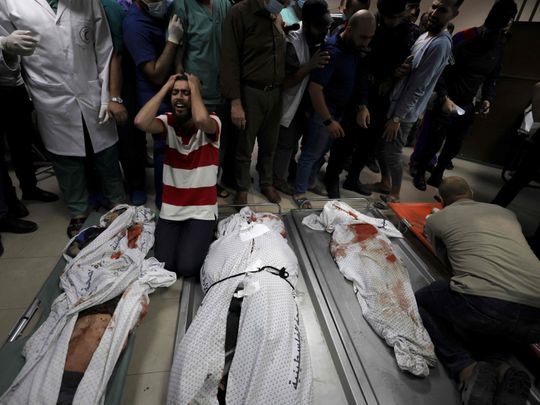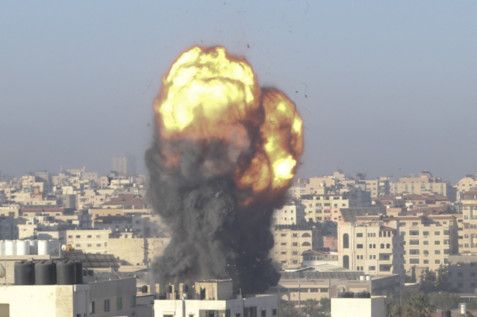
Gaza: A family of 10 were killed ein an Israeli air strike on the western Gaza Strip early Saturday. It was the deadliest single strike in Israel’s campaign. Both sides pressed for an advantage as cease-fire efforts gathered strength.
An air strike on a three-story house in a refugee camp in Gaza City killed eight children and two women from an extended family.
Mohammed Abu Hatab told reporters his wife and five children had gone to celebrate the Eid Al Fitr holiday with relatives. She and three of the children, aged 6 to 14, were killed, while an 11-year-old is missing. Only his 5-month-old son Omar is known to have survived.
The latest outburst of violence began in Jerusalem and has spread across the region, with Jewish-Arab clashes and rioting in mixed cities of Israel. There were also widespread Palestinian protests Friday in the occupied West Bank, where Israeli forces shot and killed 11 people.
The spiralling Israeli attacks has raised fears of a new Palestinian ‘intifada’, or uprising at a time when there have been no peace talks in years. Palestinians were set to mark Nakba (Catastrophe) Day on Saturday, when they commemorate the estimated 700,000 people who fled or were driven from their homes in what is now Israel during the 1948 war surrounding its creation. That raised the possibility of even more unrest.
US diplomat Hady Amr arrived on Friday as part of Washington’s efforts to de-escalate the conflict, and the UN Security Council was set to meet Sunday. But Israel turned down an Egyptian proposal for a one-year truce that Hamas rulers had accepted, an Egyptian official said Friday on condition of anonymity to discuss the negotiations.
Since Monday night, Hamas has fired hundreds of rockets into Israel, which has pounded the Gaza Strip with strikes. In Gaza, at least 126 people have been killed, including 31 children and 20 women in Israel, seven people have been killed, including a 6-year-old boy and a soldier.
Children’s toys and a Monopoly board game could be seen among the rubble of Abu Hatab’s house, as well as plates of uneaten food from the holiday gathering.
“There was no warning,” said Jamal Al Naji, a neighbour living in the same building. “You filmed people eating and then you bombed them?” he said, addressing Israel. “Why are you confronting us? Go and confront the strong people!”
Shortly afterward, Hamas said it fired a salvo of rockets at southern Israel in response to the air strike.
A furious Israeli barrage early Friday killed a family of six in their house and sent thousands fleeing to UN-run shelters. The military said the operation involved 160 warplanes dropping some 80 tons of explosives over the course of 40 minutes and succeeded in destroying a vast tunnel network used by Hamas.
Israeli media said the military believed dozens of militants were killed inside the tunnels. The Hamas and Islamic Jihad miitant groups have confirmed 20 deaths in their ranks, but the military said the real number is far higher.
Gaza’s infrastructure, already in widespread disrepair because of an Israeli-Egyptian blockade imposed after Hamas seized power in 2007, showed signs of breaking down further, compounding residents’ misery. The territory’s sole power plant is at risk of running out of fuel in the coming days.
The UN said Gazans are already enduring daily power cuts of 8-12 hours and at least 230,000 have limited access to tap water. The impoverished and densely populated territory is home to 2 million Palestinians, most of them the descendants of refugees from what is now Israel.
The conflict has reverberated widely. Israeli cities with mixed Arab and Jewish populations have seen nightly violence, with mobs from each community fighting in the streets and trashing each other’s property.

In the occupied West Bank, on the outskirts of Ramallah, Nablus and other towns and cities, hundreds of Palestinians protested against the Gaza campaign and Israeli actions in Jerusalem. Waving Palestinian flags, they trucked in tires that they set up in burning barricades and hurled stones at Israeli soldiers. At least 10 protesters were shot and killed by soldiers. An 11th Palestinian was killed when he tried to stab a soldier at a military position.
In east Jerusalem, online video showed young Jewish extremists firing pistols as they traded volleys of stones with Palestinians in Sheikh Jarrah, which became a flashpoint for tensions over attempts by settlers to forcibly evict a number of Palestinian families from their homes.
On Israel’s northern border, troops opened fire when a group of Lebanese and Palestinian protesters on the other side cut through the border fence and briefly crossed. One Lebanese was killed. Three rockets were fired toward Israel from neighbouring Syria without causing any casualties or damage. It was not immediately known who fired them.
The tensions began in east Jerusalem earlier this month, with Palestinian protests against the Sheikh Jarrah evictions and Israeli police measures at Al Aqsa Mosque, a frequent flashpoint located on a mount in the Old City revered by Muslims and Jews.
Hamas fired rockets toward Jerusalem late Monday, in an apparent attempt to present itself as the champion of the protesters.
Prime Minister Benjamin Netanyahu has vowed that Hamas will “pay a very heavy price” for its rocket attacks as Israel has massed troops at the frontier. US President Joe Biden has expressed support for Israel while saying he hopes to bring the violence under control.
Hamas has fired some 2,000 rockets toward Israel since Monday, according to the Israeli military. Most have been intercepted by anti-missile defences, but they have brought life to a standstill in southern Israeli cities, caused disruptions at airports and have set off air raid sirens in Tel Aviv and Jerusalem.








